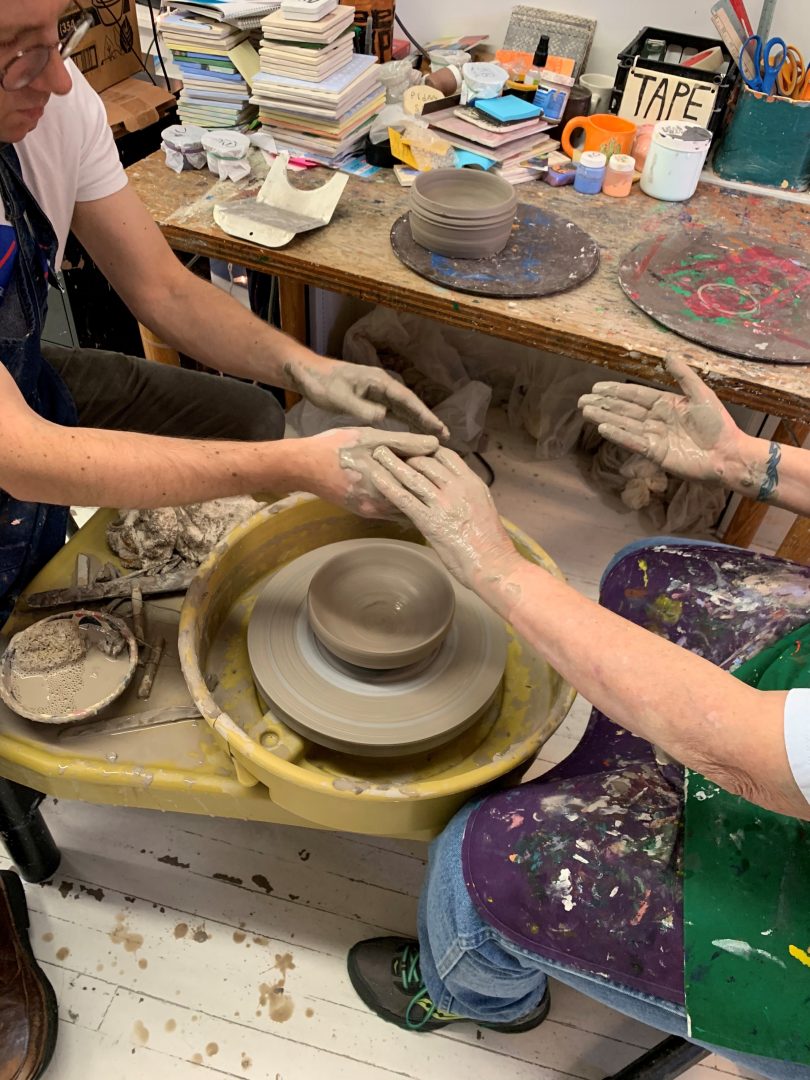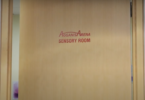By Noemi Arellano-Summer
BU News Service
BROOKLINE – Gateway Arts, which began in 1973, assists disabled artists with career development. This program now supports around 100 artists, but it originally began with just nine housed in a small basement in Brighton.
Director Rae Edelson has been with Gateway since 1978 and has overseen the development of the program. From that Brighton basement, Gateway has grown to now have an on-site store and gallery as well as extensive, well-lit studio space.
“I provide an opportunity for people to form themselves, tell their life stories and to be happy in the choices that they make,” Edelson said. “It’s very important to forge your identity as you go through life. Art is just a wonderful bridge.”
Gateway Arts has two primary studios. Artists come in as they need, generally two to five days a week, which also depends on funding and space availability. The Main Studio focuses on career development and creating art and has subject-specific studios inside it, such as the Fabric and Paper studios.
Studio A, on the other hand, specifically provides career support for artists with psychiatric disabilities, autism spectrum disorders, mental illness and head injuries. Artists work individually at their own pace, having arrived with varying degrees of arts education and experience. What they work on depends on their own talent and interest.
Jillian Hurley works as the Fabric Studio facilitator, having taken over the job from former fellow Massachusetts College of Art and Design classmate Mina Ha in 2017. She considers her job to be threefold: supervising artists, supporting the studios and encouraging the creative process.
“In our fabric studio, artists create soft sculpture, embroider, make and alter clothing with sewing, surface design and more,” Hurley said. “My role as a facilitator is to help the artists realize their artistic vision, sometimes by offering my design perspective or teaching a new technique, sometimes with hands-on support. Working at Gateway has been inspiring for me personally, professionally and in my own art practice.”
Bohill Wong was a painter and sculptor from West Roxbury who Edelson considers a success story. A PBS Special featuring Wong won an Emmy in 1997. According to his 2004 obituary in the Boston Globe, his work was “daffy and whimsical”.
Now, though, Gateway Arts is seeing new faces and disabilities.
“When we started out, this was all people with intellectual disabilities. Well, those people are aging out,” Edelson said. “And what is the new population? It’s autism.”
In 2014, Gov. Charlie Baker signed the Autism Omnibus Law, which addressed previously unmet needs of people with autism living in Massachusetts. The Autism Omnibus Law required that medical treatments be covered and eligibility for the Department of Developmental Services.
Among other provisions, the law also necessitated that the Department of Mental Health and Department of Developmental Services provide plans for services for those with a mental illness or developmental disability.
Vinfen, Gateway Arts’ parent company, is a service provider working with individuals with disabilities, brain injuries and mental health challenges through more than 300 programs. Employment, residential, outreach and other services are offered.
“It’s whatever the person needs in order to live the life that they want to live and achieve the goals that they want to achieve,” said Erin Tighe, communications and development director at Vinfen.
Edelson’s two current goals for Gateway are monetary. Gateway Arts would like to find a new home by 2025 when the current building lease ends. The other goal is to continue to recruit new artists. Edelson would particularly like to increase services for artists with chronic psychiatric illnesses. Gateway gains new members through state agencies, service coordinators, private clients and word of mouth.
The Main Studio is funded largely by the Department of Developmental Services. Studio A is funded in part by the Massachusetts Rehabilitation Commission, the Massachusetts Commission for the Blind and private clients.
The coronavirus has forced Gateway Arts to temporarily close, though Edelson said that services are continuing virtually as well as their online store.
In 2000, Gateway Arts opened a retail store for their artists’ work, located at 60 Harvard St. in Brookline. Edelson considered the idea for the shop to be “natural” and called it “identity-building” for the artists involved. Those artists are paid 50% of the profits and hold the copyright for their work.
Edelson joined Gateway after moving from New York with her children. She had previously run services for the United Cerebral Palsy organization in Brookline and has degrees in special education and theater.
“I had no idea that I was a closet entrepreneur,” she said. “It was happenstance, and it was perfect because it combined my interest in special needs – I’m a learning disability specialist – [with] my interest in the arts, though my art background is in theater. I very much enjoy working with artists on the staff.”
There are fears about dwindling public funding and its impact on services such as Gateway Arts, but Edelson remains optimistic.
“Everyone in the world is going to experience disability at some point or other in their life,” Edelson said. “To think that you can get away without this happening is not possible, so hopefully we will keep on growing the services available and take care of society and our people because folks with disability and artists enrich the culture. It’s simple as that.”





